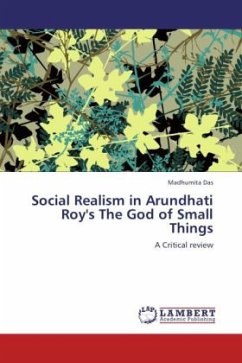Arundhati Roy's "the God of Small Things' has widely been hailed as the finest, the most bold and artistically adventurous novel to appear in recent years in Indian English. It is vibrant with a rebellious spirit which seeks to break away from the conventional paradigms in its selection of a challenging theme and narrative modes. By highlighting the age-old anguishes of the untouchable represented here in Velutha, the helpless women in a middle class traditional family, Ammu and her daughter Rahel, Arundhati Roy critiques the deep-rooted social conventions of exploitation of those living on the margin. In order to unravel the deep scars, inner turmoil, painful tensions and agonies of those helplessly trapped and hunted, the novelist projects the hard social realism of our post-modern time with all her artistic talent as a creative writer and with all her committed vision as a social activist.
Bitte wählen Sie Ihr Anliegen aus.
Rechnungen
Retourenschein anfordern
Bestellstatus
Storno








